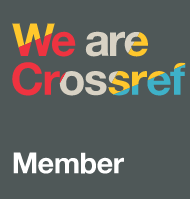DO SOCIAL MEDIA CONTENT MARKETING AND CUSTOMER ENGAGEMENT INFLUENCE PURCHASE INTENTION? EVIDENCE FROM INDONESIAN CUSTOMERS
Abstract
Content marketing emerged as a popular strategic marketing initiative for the digitization of information, which has undergone dramatic changes. The emergence of social media has become a driving force behind change in the field of marketing, especially in relation to connecting with customers and engaging them in the activities of creating or sharing content and business transactions. Therefore, this research aims to reveal the influence of content marketing and customer engagement in social media on purchase intention. This research uses a quantitative- deductive approach and uses the survey method to collect data. There is empirical evidence that consumer engagement mediates the relationship between content marketing and purchase intention. Other empirical analysis results are expressed in the discussion section.
Keywords
Full Text:
PDFReferences
Abed, S. S., Dwivedi, Y. K., & Williams, M. D. (2015). Social media as a bridge to e-commerce adoption in SMEs: A systematic literature review. The Marketing Review, 15(1), 39–57.
Ahmad, Y.Y, & Ilkay, K. (2019) The impact of content marketing on consumers’ purchase intention for home appliances: A study in Afghanistan. International Journal of Business and Management Invention (IJBMI), 2319, 38-47.
Baltes, L. P. (2015). Content marketing-the fundamental tool of digital marketing. Bulletin of the Transilvania University of Brasov. Economic Sciences. Series V, 8(2), 111.
Bowden, J. (2009b). Customer engagement: A framework for assessing customer-brand relationships: The case of the restaurant industry. Journal of Hospitality Marketing & Management, 18(6), 574-596.
Bowden, J. L. H. (2009a). The process of customer engagement: A conceptual framework. Journal of marketing theory and practice, 17(1), 63-74.
Brodie, R. J., Fehrer, J. A., Jaakkola, E., & Conduit, J. (2019). Actor engagement in networks: Defining the conceptual domain. Journal of Service Research, 22(2), 173–188.
Brodie, R. J., Hollebek, L., Juric, B., & Ilic, A. (2011). Customer Engagement: Conceptual Domain, Fundamental Propositions and Implications For Research. Journal of Service Research, 14 (3), 252-271.
Brodie, R. J., Ilic, A., Juric, B., & Hollebeek, L. (2013). Consumer engagement in a virtual brand community: An exploratory analysis. Journal of business research, 66(1), 105-114.
Dolan, R., Conduit, J., Frethey-Bentham, C., Fahy, J., & Goodman, S. (2019). Social media engagement behavior: A framework for engaging customers through social media content. European Journal of Marketing, 53(10), 2213-2243.
Du Plessis, C. (2022). A Scoping Review of the Effect of Content Marketing on Online Consumer Behavior. SAGE Open, 12(2), 21582440221093042.
Edelman, D. C., & Singer, M. (2015). Competing on customer journeys. Harvard Business Review, 93(11), 88–100.
El Kedra, A. M., & Şener, D. U. (2020). The Mediating Role of Social Media and Customer Engagement in the Impact of Digital Content Marketing on Brand Awareness. International Research Journal of Marketing & Economics, 7(11), 1-11.
Fornell, C.; Larcker, D.F. (1981) Evaluating structural equation models with unobservable variables and measurement error. J. Mark. Res. 1981, 18, 39–50
Gambetti, R. C., & Graffigna, G. (2010). The concept of engagement: A systematic analysis of the ongoing marketing debate. International Journal of Market Research, 52(6), 801-826.
Gamble, S. (2016). Visual content marketing: Leveraging infographics, video, and interactive media to attract and engage customers. John Wiley & Sons.
Harrigan, P., Evers, U., Miles, M., and Daly, T. (2018). Customer engagement and the relationship between involvement, engagement, self-brand connection and brand usage intent. Journal of Business Research, Vol. 88, pp. 388–396.
Hollebeek, L. (2011). Exploring customer brand engagement: definition and themes. Journal of strategic Marketing, 19(7), 555-573.
Hollebeek, L. D. (2019). Developing business customer engagement through social media engagement-platforms: An integrative SD logic/RBV-informed model. Industrial Marketing Management, 81, 89–98.
Hollebeek, L. D., & Macky, K. (2019). Digital content marketing's role in fostering consumer engagement, trust, and value: Framework, fundamental propositions, and implications. Journal of interactive marketing, 45(1), 27-41.
Hollebeek, L. D., Glynn, M. S., & Brodie, R. J. (2014). Consumer brand engagement in social media: conceptualization, scale development and validation. Journal of Interactive Marketing, 28(2), 149–165
Hollebeek, L., & Andreassen, T. (2018). The S-D logic informed ‘hamburger’ model of service innovation and its implications for engagement and value. Journal of Services Marketing, 32(1), 1–7.
Holliman, G., & Rowley, J. (2014). Business to business digital content marketing: Marketers’ perceptions of best practice. Journal of Research in Interactive Marketing, 8(4), 269–293.
Huang, T., Bao, Z., & Li, Y. (2017). Why do players purchase mobile social network games? An examination of customer engagement and of uses and gratifications theory. The program, 51(3), 259–277.
Husnain, M., & Toor, A. (2017). The impact of social network marketing on consumer purchase intention in Pakistan: Consumer engagement as a mediator. Asian Journal of Business and Accounting, 10(1), 167-199.
Islam, J. U., Hollebeek, L. D., Rahman, Z., Khan, I., & Rasool, A. (2019). Customer engagement in the service context: an empirical investigation of the construct, its antecedents and consequences. Journal of Retailing and Consumer Services, 50, 277–285.
Kajtazi, K., & Zeqiri, J. (2020). The effect of e-WOM and content marketing on customers’ purchase intention. International Journal of Islamic Marketing and Branding, 5(2), 114.
Karr, D. (2016). How To Map Your Content To Unpredictable Customer Journeys. Meltwater Outside Insigh.
Kartajaya, H., Kotler, P., & Setiawan, I. (2016). Marketing 4.0: moving from Traditional to Digital. John Wiley & Sons.
Koiso-Kanttila, N. (2004). Digital content marketing: a literature synthesis. Journal of marketing management, 20(1-2), 45-65.
Kotler, P. & Armstrong, G. (2018). Principle of Marketing. Global 17th Edition. London: Pearson. Kucuk, S. U., & Krishnamurthy, S. (2007). An analysis of consumer power on the
Internet. Technovation, 27(1-2), 47-56.
Lee, D., Hosanagar, K., & Nair, H. S. (2018). Advertising content and consumer engagement on social media: Evidence from Facebook. Management Science, 64(11), 5105–5131.
Lim, W. M., & Ting, D. H. (2012). E-shopping: An analysis of the uses and gratifications theory. Modern Applied Science, 6(5), 48.
Lou, C., & Xie, Q. (2020). Something social, something entertaining? How digital content marketing augments consumer experience and brand loyalty. International Journal of Advertising, 40(3), 376–402.
Maczuga, P., Sikorska, K., Jaruga, A., Zieliński, K., Boncio, E., Cardoni, G., & Poschalko, A. (2014). Content Marketing Handbook–Simple Ways to Innovate Your Marketing Approach. Warsaw: CMEX.
Malthouse, E. C., Calder, B. J., Kim, S. J., & Vandenbosch, M. (2016). Evidence that usergenerated content that produces engagement increases purchase behaviours. Journal of Marketing Management, 32(5–6), 427–444.
Milhinhos, P. R. V. (2015). The impact of content marketing on attitudes and purchase intentions of online shoppers: the case videos & tutorials and user-generated content (Doctoral dissertation).
Naidoo, R., & Potgieter, L. M. (2017). Factors explaining user loyalty in a social media-based brand community. South African Journal of Information Management, 19(1), 1-9.
Pachauri, M. (2001). Consumer behaviour: a literature review. The Marketing Review, 2(3), 319- 355.
Pacherie, E., & Haggard, P. (2010). What are intentions. Conscious will and responsibility. A tribute to Benjamin Libet, 7, 70-84.
Pansari, A. and Kumar, V. (2018). Customer engagement marketing. In: R. Palmatier, V. Kumar, & C. Harmeling (Eds.), Customer Engagement Marketing. Springer, pp. 1-27.
Pansari, A., & Kumar, V. (2017). Customer engagement: the construct, antecedents, and consequences. Journal of the Academy of Marketing Science, 45, 294-311.
Prentice, C., Wang, X., & Loureiro, S. M. C. (2019). The influence of brand experience and service quality on customer engagement. Journal of Retailing and Consumer Services, 50, 50-59.
Pronschinske, M., Groza, M. D., & Walker, M. (2012). Attracting Facebook'fans': The importance of authenticity and engagement as a social networking strategy for professional sport teams. Sport marketing quarterly, 21(4), 221.
Pulizzi, J. (2012). The rise of storytelling as the new marketing. Publishing research quarterly, 28(2), 116-123.
Pulizzi, J. (2013). Epic content marketing: How to tell a different story, break through the clutter, and win more customers by marketing less. McGraw-Hill Education.
Rancati, E., & Gordini, N. (2014). Content marketing metrics: Theoretical aspects and empirical evidence. European Scientific Journal, 10(34), 1857–7881.
Rowley, J. (2008). Understanding digital content marketing. Journal of marketing management, 24(5-6), 517-540.
Sashi, C. M. (2012). Customer engagement, buyer‐seller relationships, and social media. Management decision, 50(2), 253-272.
Shahbaznezhad, H., Dolan, R., & Rashidirad, M. (2021). The role of social media content format and platform in Users’ engagement behavior. Journal of Interactive Marketing, 53, 47–65.
Sheng, J. (2019). Being Active in Online Communications: Firm Responsiveness and Customer Engagement Behaviour. Journal of Interactive Marketing, 46, 40–51.
So, K. K. F., King, C., & Sparks, B. (2014). Customer engagement with tourism brands: Scale development and validation. Journal of Hospitality & Tourism Research, 38(3), 304-329.
So, K., King, C., Sparks, B., and Wang, Y. (2016). The role of customer engagement in building consumer loyalty to tourism brands. Journal of Travel Research, Vol. 55 No. 1, pp. 64-78.
Spears, N., & Singh, S. N. (2004). Measuring attitude toward the brand and purchase intentions. Journal of current issues & research in advertising, 26(2), 53-66.
Steward, M. D., Narus, J. A., & Roehm, M. L. (2018). An exploratory study of business-tobusiness online customer reviews: External online professional communities and internal vendor scorecards. Journal of the Academy of Marketing Science, 46(2), 173–189.
Strauss, J., Frost, R., & Sinha, N. (2014). E-marketing (p. 496). Upper Saddle River, NJ: Pearson. Taiminen, K., & Ranaweera, C. (2019). Fostering brand engagement and valueladen trusted B2B relationships through digital content marketing: The role of brand’s helpfulness. European Journal of Marketing, 53(9), 1759–1781.
Van Doorn, J., Lemon, K., Mittal, V., Nass, S., Pick, D., Pirner, P., and Verhoef, P. (2010). Customer engagement behavior: Theoretical foundations and research directions. Journal of Service Research, 13(3), 253–266.
Verhoef, P. C., Reinartz, W. J., & Krafft, M. (2010). Customer engagement as a new perspective in customer management. Journal of service research, 13(3), 247-252.
Vieira, V. A., de Almeida, M. I. S., Agnihotri, R., da Silva, N. S. D. A. C., & Arunachalam, S. (2019). In pursuit of an effective B2B digital marketing strategy in an emerging market. Journal of the Academy of Marketing Science, 47, 1085-1108.
Vivek, S. D., Beatty, S. E., & Morgan, R. M. (2012). Customer engagement: Exploring customer relationships beyond purchase. Journal of marketing theory and practice, 20(2), 122-146.
Voorveld, H. A., Van Noort, G., Muntinga, D. G., & Bronner, F. (2018). Engagement with social media and social media advertising: The differentiating role of platform type. Journal of advertising, 47(1), 38-54.
Wang, W. L., Malthouse, E. C., Calder, B., & Uzunoglu, E. (2019). B2B content marketing for professional services: In-person versus digital contacts. Industrial marketing management, 81, 160-168.
Yang, M., Ren, Y., & Adomavicius, G. (2019). Understanding user-generated content and customer engagement on Facebook business pages. Information Systems Research, 30(3), 839-855.
Zhang, J., & Du, M. (2020). Utilization and effectiveness of social media message strategy: how B2B brands differ from B2C brands. Journal of Business & Industrial Marketing, 35(4), 721-740.
DOI: https://doi.org/10.33373/dms.v11i3.5122
Refbacks
- There are currently no refbacks.

This work is licensed under a Creative Commons Attribution-NonCommercial-ShareAlike 4.0 International License.











